Table of Contents
Esports and video games are hugely popular around the world. They are great entertainment for millions of fans, but also a lucrative source of income for professional players. However, in the world of gaming, not everything is just fun and games. The most alarming aspect is the amount of time that players spend sitting down while playing the game itself. Whilst for regular players it can mean just a few hours a week, professional e-athletes practise for up to 8 hours a day. There are various health risks and problems associated with this that make gaming an unhealthy activity. However, it is often only about how each individual approaches this issue, and despite the impending problems, gaming can also be done in a healthy way. How? We’ll tell you in today’s article.
What are unhealthy gaming habits
Right off the bat it should be said that unhealthy gaming habits are not officially recognized as a diagnosis. Although, with the ever-growing popularity of gaming, that may happen one day. Let’s start with a couple of interesting statistics: [12–14]
Interesting statistics from the world of gaming
- in 2023 there are more than 3 billion active players in the world
- 64% of US adults play games regularly
- the average age of a casual gamer is 34, while the average age of an addicted gamer is 24
- 30% of UK gamers admit to skipping a shower or meal because of gaming
- 8.5% of youth aged 8-18 can be described as pathological gamers, their unhealthy gaming habits cause them social, psychological and school problems
Unhealthy gaming habits are those which can cause you to get in over your head.
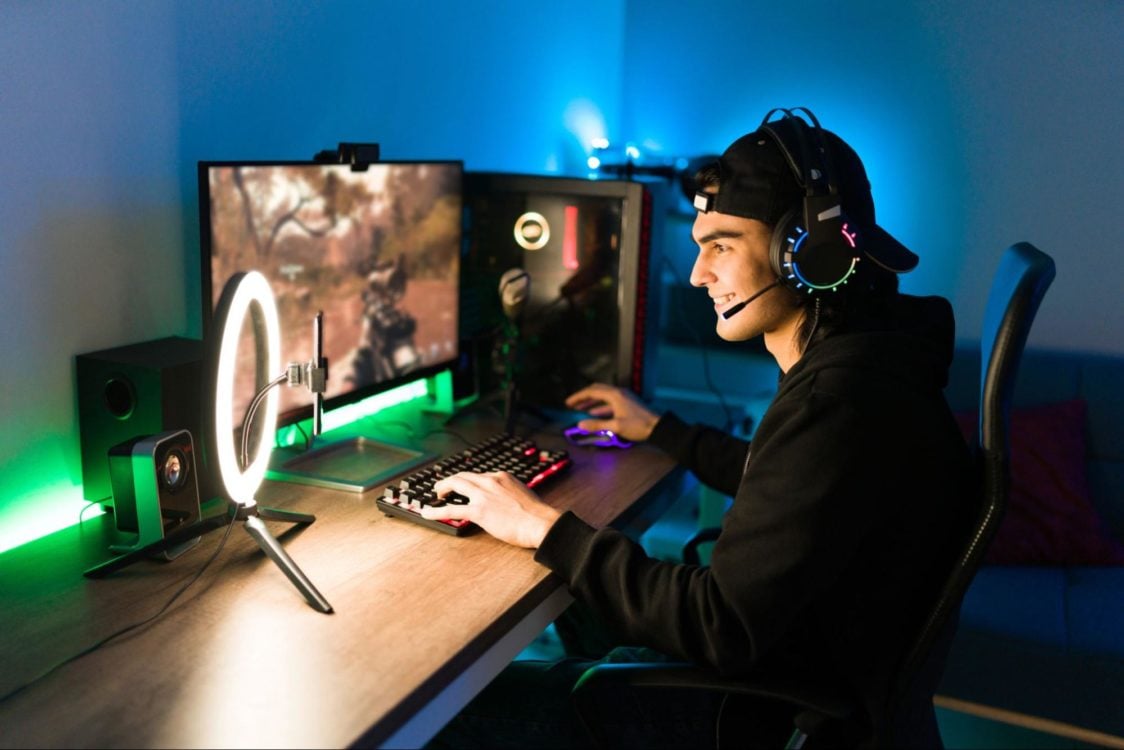
Manifestations of unhealthy gaming habits
For example, it can be considered unhealthy if a player [1–2]:
- feels anxious, sad or irritable when not able to play
- lies about how much time he/she spent playing
- is no longer interested in other hobbies that he/she used to do
- neglects certain aspects of life at the expense of games (e.g. relationships, education, physical health)
- uses gaming to alleviate depression or bad mood
- spends an excessive amount of money on games
- neglects sleep, optimal nutrition, movement or other personal care activities at the expense of gaming
- unable to quit or play less
- has problems at college or at work due to gaming
Of course, these should be taken with a grain of salt, as they can vary from player to player. Moreover, not everyone who loves video games automatically has a problem with an unhealthy approach to gaming. The diagnosis occurs only when gaming becomes an addiction. According to several sources, only a few people meet the criteria for gaming addiction. A study in the American Journal of Psychology also looked at this issue. They watched almost 19,000 adult players from the USA, Great Britain, Germany and Canada. They found that the criteria for the diagnosis of addiction or disorders are met by only 0.3 to 1% of people. [3]
Who can unhealthy gaming habits affect?
According to Statista, the global average of the longest lasting consecutive gaming session was about 5.1 hours in 2021. In the US, this number was higher and climbs up to six hours. If gamers don’t balance this time with sufficient physical activity (at least 150 minutes per week according to the NHS), they can expose themselves to the risks associated with a sedentary lifestyle. [4–5]
However, unhealthy gaming habits can affect anyone who exhibits the symptoms mentioned above. And it doesn’t matter whether they are children, youngsters or older players. A bad attitude towards gaming often goes hand in hand with neglecting a healthy lifestyle. This is also proven by a study by the American Society of Nutrition, which followed college students playing games. Compared to the non-gaming group, the gamers tended to exercise less, consume more sodium and unhealthy foods high in saturated fat. They also mention a larger waist circumference or a lower intake of fruits and vegetables. E-athletes who have to train hard every day may be naturally more at risk. [6]
You might be interested in these products:
Is eSports healthy?
Esports itself represents a more serious, professional approach to gaming that includes training similar to that of athletes in the real world. These players usually train about 6–8 hours a day, often including weekends. Some sources even state that eSports players spend up to 10–15 hours a day playing. They also have their own trainers, evaluate their results and most of them follow a set daily routine. [7]
The problem in the case of eSports is also, unsurprisingly, a sedentary lifestyle. It’s even more serious than in the case of casual gamers. Tournaments are no exception, where some players sit for up to 12 hours, even during breaks as they use them to analyse the game and prepare a strategy for the next round of the tournament.
Whether it is training for several hours a day or sitting during a tournament, such a lifestyle is not at all beneficial for our health. Below are some of the conclusions drawn by various studies.
- If you are further interested in the world of eSports and its representatives, you should definitely check out our article What Is eSports and What Does the World of Virtual Athletes Look Like.
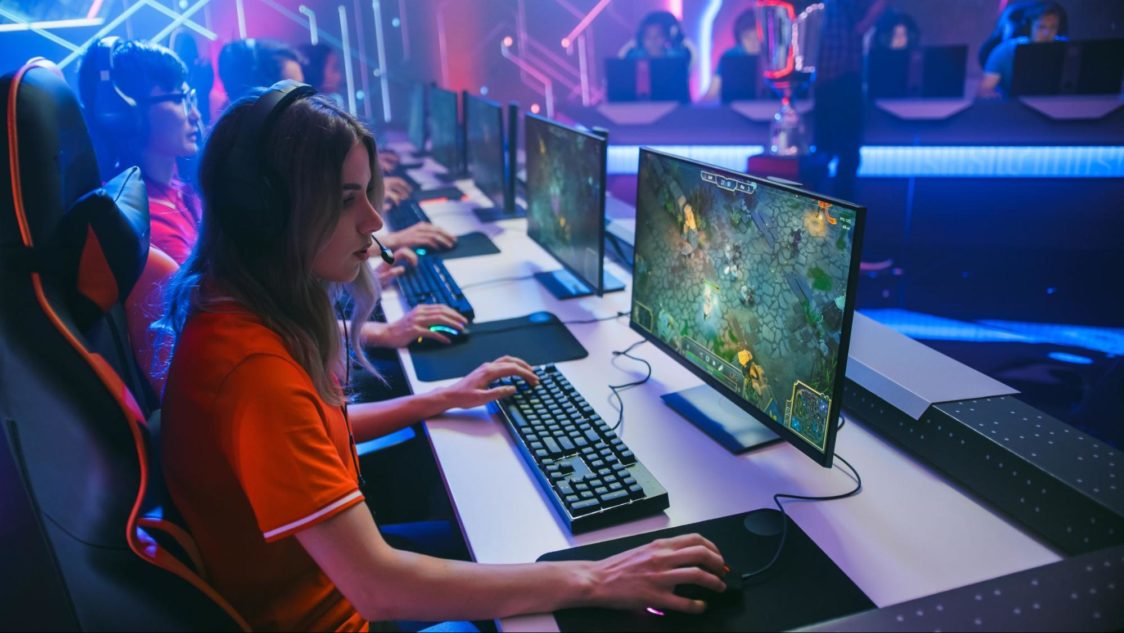
Results of studies related to a sedentary lifestyle
People who sit a lot are at a higher risk of [8–9]:
- depression and anxiety
- some types of cancer
- cardiovascular diseases
- more tiredness than when standing
- mortality
- diabetes
- obesity
Esports players and casual gamers are also exposed to these risks. Casual gamers are actually affected the most.
Esports athletes vs. casual players, who is worse off?
As mentioned earlier, a professional e-athlete most likely has his own routine, which is set in such a way that he balances sitting at the computer or console with a healthy lifestyle. In most cases these players also find time for exercise, sleep, family and friends.
Amateur or casual players, on the other hand, spend their free time trying to get better and push their limits in order to achieve professional success. In reality this means that they likely train for hours without thinking about their health. Fast-food diet, a large amount of energy or sugary drinks, no exercise, minimal physical activity and neglect of sleep are no exceptions. [10]

What should a healthy approach to gaming look like?
Casual Players
The gaming is considered healthy only if playing games is not the only activity in your life. Healthy gamers spend time with their family, go to school or work, have friends not only online, but especially in the real world, and enjoy other interests besides gaming. If gaming is a positive habit, it can be taken as a normal part of life. The players find time for it, but it doesn’t affect their health, and they have for manage college, work or other normal duties. [15]
Professional eSports Players
The situation is a bit different for professionals, as the team management takes care of a healthy approach to gaming. Big eSports teams invest huge amounts of money in the health and fitness of their players. They fight for attractive prizes, and any injury to an individual can have a devastating impact on the success of the whole team. These players have their own fitness trainers, they do sports and their diet is set up in a healthy way. The good health of professional gamers is also confirmed by a study by the Queensland University of Technology, which claims that eSports players are 21% healthier than the general population. 1,400 professionals took part in the research, most of whom confirmed that they don’t smoke and hardly ever drink alcohol. [11]
Simple tips to support healthy gaming
However, even casual gamers can take care of their health. Esport Healthcare, a website focused on the health of gamers and e-athletes, recommends doing the following every 15 to 20 minutes:
- Give your eyes a break – while playing, your eyes focus only on the monitor or screen in front of you. If you play without a break, your eyesight gets strained a lot. Your eyes are dry and tired to the point where your distance vision may get blurry. Instead, give your eyes a break by looking into the distance for a while and focusing on different objects behind the monitor or around you. If you want to be extra careful, you can try the Eye Support.
- Stand up – in the heat of playing you may forget how many hours your body has been sitting still. The issue of sitting was discussed earlier, so you already know that this lifestyle is definitely not healthy. Instead, take a break. Stand, walk or stretch your muscles.
- Don’t forget about your neck – the neck and head also lack movement while playing, because in the heat of the game people often tend to have bad posture. This can cause stiffness and, over time, unpleasant pain. Therefore, don’t forget to use your break to regularly move your neck. You can try turning your head to both sides, turning from left to right or bending your neck from front to back.
- Blink – when in the zone, it often happens that players barely blink so as not to miss anything. The result of this can be dry eyes and subsequent burning sensation. Blinking can mitigate these issues. Try to keep it in mind and blink regularly while playing. If you realize that you haven’t blinked in a while, try blinking hard 5 to 10 times at a time.
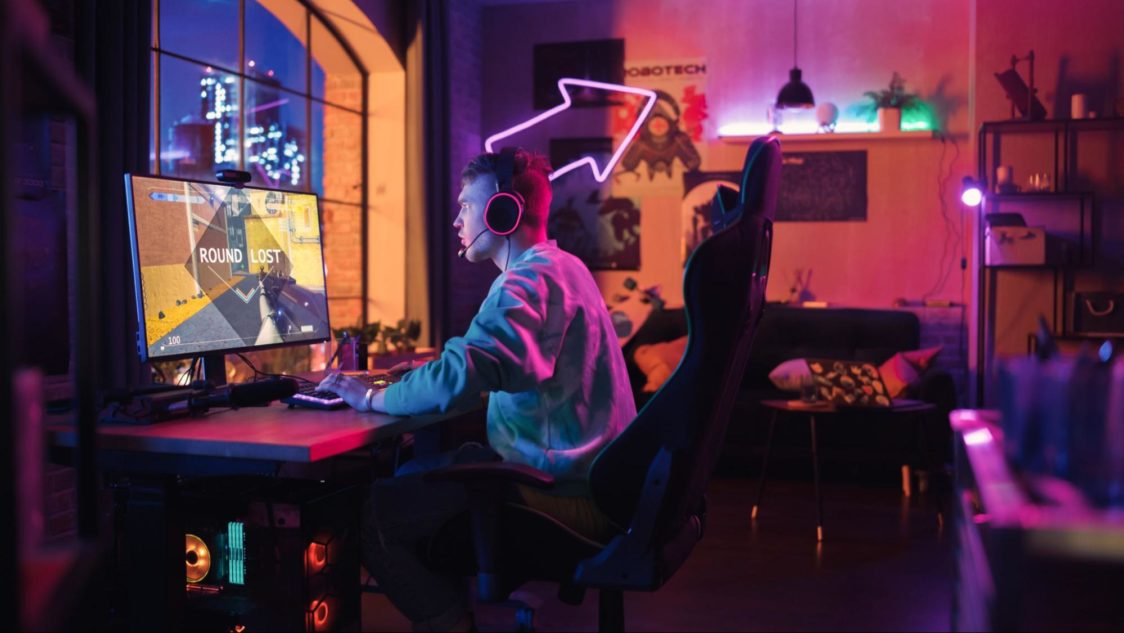
6 tips on how to enjoy playing games in a healthy way
Below you can find a few more tips that will help with a healthy approach to gaming.
1. Set boundaries or play for a reward
One of the main problems while playing is that one can get completely lost in it and easily forget the time. The result of this can be not only unhealthily long sitting, but also neglecting duties and other cons mentioned above. So if you feel like gaming is taking up too much of your time, the solution is to set boundaries. Set a specific time in advance that you can devote to gaming, taking into consideration your responsibilities.
If you’re worried about unconsciously stretching it, set an alarm or a stopwatch on your smartphone. Alternatively, use software that notifies you when the specified time has passed. If you need to focus on other things while playing, don’t play online, but choose a game that can be easily paused. Playing for a reward can also help with setting boundaries. That is, only after you have fulfilled all your daily obligations. This is a great way how to harness motivation and avoid the negative effects of gaming on your life. [16]
2. Avoid unconscious overeating
Proper diet is important not only for gamers, but also for anyone who cares about their health. Unhealthy eating habits can have a negative impact on body weight, health, well-being or your energy level.
It is also very important to avoid unconscious overeating when playing games and sitting in front of a screen. Players often order pizza, eat crisps or something sweet while playing. Then, in the heat of the game, they can’t control themselves and very easily consume a lot of calories from unhealthy snacks flushed down with some more calories from soda or energy drinks.
The solution could be so-called mindful eating, i.e. conscious food consumption. This would mean that you shouldn’t eat in front of the monitor. You can enjoy your meal in a comfortable place without distractions such as TV, radio, etc. You can apply the same rules to snacks. And if you want to have them while playing, try smaller portions. In the case of crisps, you can just pour some into a small bowl. Even if you eat them all in the heat of the game, an empty bowl will be a signal that you have already finished your portion. It would be even healthier to completely exclude crisps and replace them with, for example, a small portion of dried fruit, nuts or an alternative in the form of protein crisps. [17]
- If you are further interested in this issue, be sure to read our article What Is a Healthy Diet and How to Eat Healthy?

3. Don’t forget about sufficient water intake
As in the case of food, it’s also very easy to forget about drinking enough liquids. If you’ve just spent a few hours in the virtual world during which you drank a glass or two of water, you’re not even close to an optimal liquids intake. According to experts from the Institute of Medicine of the National Academies, it should look like this. [18]
How much water should you drink per day?
- 30-45 ml of water per kilogram of body weight
- 2.7 liters for women (about 11 glasses)
- 3.7 liters for men (about 15 glasses)
Therefore, a bottle of water should always be on your gaming table, and you should drink from it at least every half hour. The supply of fresh water can help to avoid dehydration, which is associated with unpleasant symptoms such as headache, dry mouth or dizziness.
- If you are more interested in this topic, read our article How Insufficient Water Intake Affects Your Health.
To make your virtual battles even better, try some of the supplements made for gamers
If you don’t like pure water, you can sometimes use powdered supplements for gamers, which give it a taste and bring other benefits to sharpen your senses. They contain adaptogens, nootropics and important vitamins and minerals. These gaming supplements are used by players in the form of powder or capsules to support maximum gaming performance.
- If you are more interested in this topic, check out our article The Best Dietary Supplements for Gamers and E-Athletes.
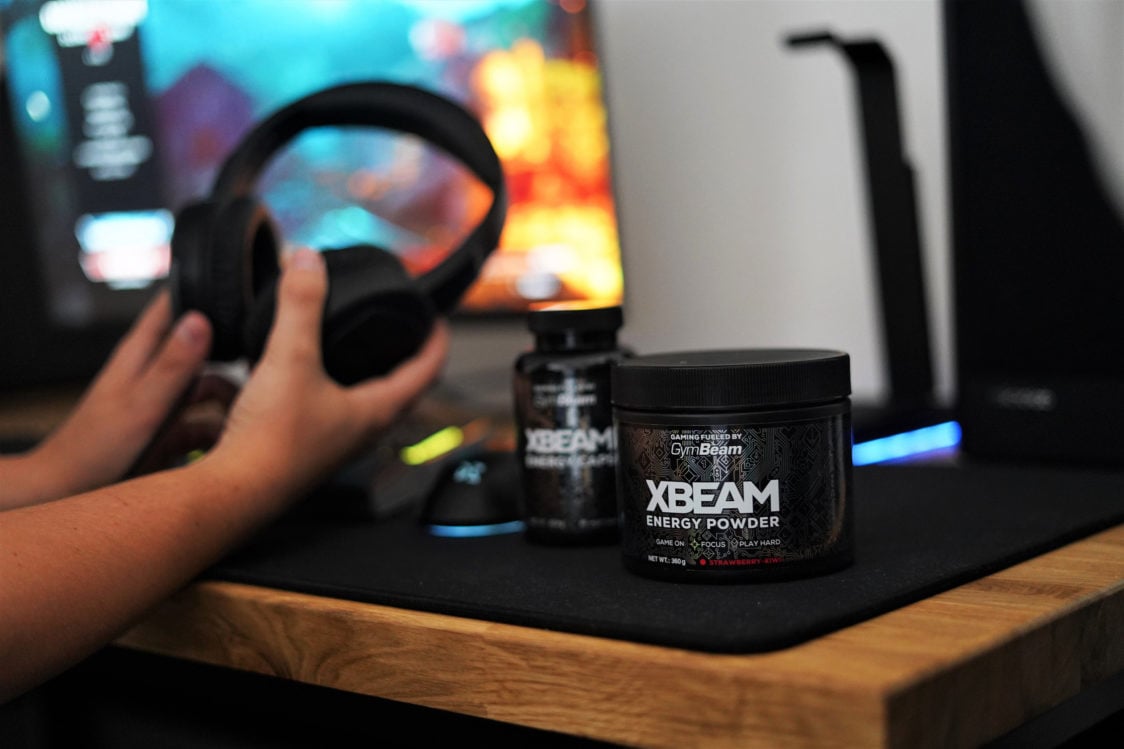
4. Don’t forget about quality sleep
Although it is not a rule, many people play games especially in the evening, after they come home from work or college and take care of their regular duties. If they don’t set the boundaries discussed earlier, they can easily play for several hours late into the night. They wake up tired in the morning, which then affects their whole day. In addition, long-term lack of sleep can have a negative effect on overall health. This brings such problems as fatigue, irritability, mood swings, difficulty concentrating or weight gain. [19]
In order to avoid the mentioned manifestations, make sure you get enough sleep every day. The amount in this case varies from person to person, but 7–9 hours of sleep per day is considered a general recommendation for the average adult. How to do that? Try to turn off the game at least an hour before bed so that your body can relax enough and your eyes can rest. Also, plan your gaming sessions so that you don’t have to stay up late if you have to wake up early the next day. The technique from the first point might come in handy. Set a timer to remind you that it’s time to finish playing and get ready for bed. [20] [29]
- If you find this topic interesting, read our article What Happens to Your Body When You Don’t Get Enough Sleep?
5. Mind your posture
The consequences of sitting, which we talked about earlier, can be partially minimized by sitting correctly. What’s the trick? [21 – 22]
The guide to good posture at a computer
- When sitting, try not to slouch or lean forward and maintain a straight position with relaxed shoulders.
- Keep your neck and head straight without tilting.
- The key is to sit with your backside all the way back in the seat to get support in your lower back. If you have just a regular chair without lumbar support, you can try placing a small pillow or a rolled blanket or towel behind your lower back. A relaxation and back massage pad is also a great accessory for lower back support. It provides extra support and helps to correct your sitting posture.
- Your whole feet should be placed flat on the ground.
- Your knees should be naturally spaced apart and at a 90-degree angle at the joints.
- Don’t sit with your legs crossed.
- The monitor should be at least an arm’s length away from you and placed at eye level.
- Adjust the tilt of your keyboard. It should be positioned in such a way that you don’t bend your wrists while typing on it and thus don’t create unnecessary pressure on them.
- You can also consider using ergonomic mouse and keyboard.
Of course, you don’t have to sit this way for several hours without a break. You can always slightly change the position of your body.
- If your back hurts while sitting and you want to learn more about this topic, read our article Back Pain: 10 Most Common Causes and Solutions to Get Rid of It.
6. Try interactive sports games
One great way to play healthier is to try interactive games on one of the various VR platforms. Their big advantage is that you don’t have to sit down while playing and your whole body gets involved. PC and consoles such as Xbox, Nintendo or PlayStation all offer many similar titles. There is a really wide selection to choose from, including many fighting games, various simulators, sports or music games. The result is a really fun and active experience which will get you moving. A big advantage is also that most of these games can be played with friends, which in turn enriches the social aspects of your life. [23]
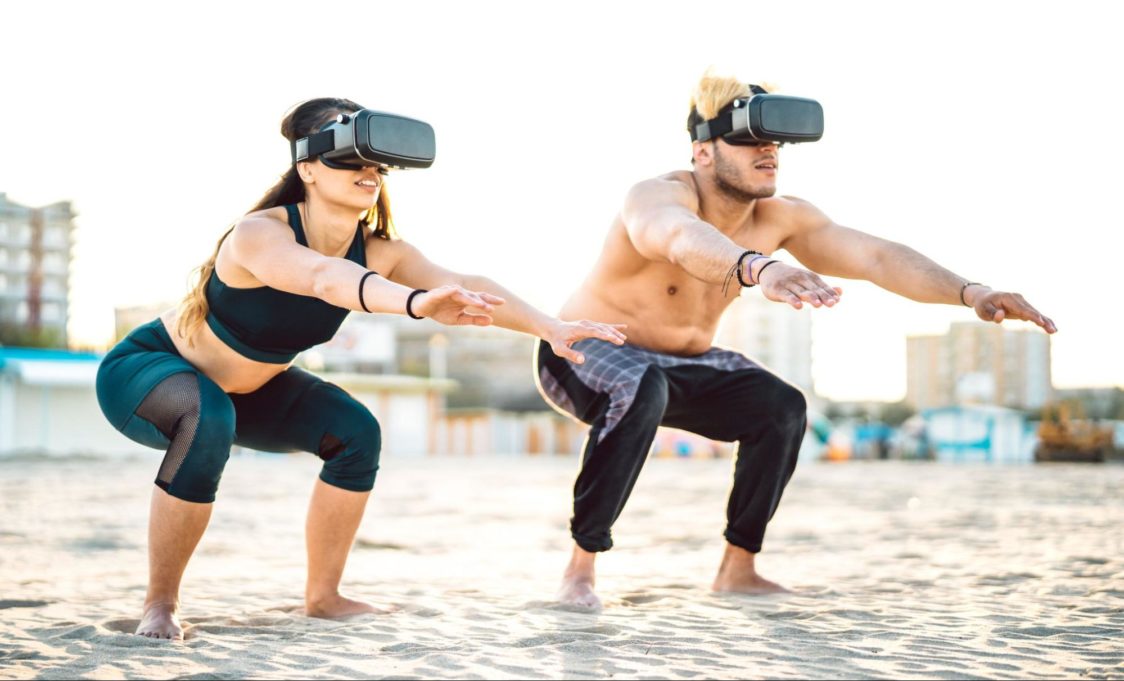
Conclusion
Playing games itself is definitely not bad and offers many benefits. It develops, for example, cognitive abilities or logical thinking and also improves the ability to make faster decisions. If it grows to a professional level, it opens the door to the world of eSports, in which players become celebrities competing for attractive financial prizes in front of millions of fans from all over the world. However, you can benefit from playing games only if your approach to gaming is healthy. In case you have the opposite feeling, definitely try one of our tips above. Because any game is beneficial only as long as you have fun with it and as long as it doesn’t have a negative impact on your health. [24]
[1] Claire McCarthy - Unhealthy Video Gaming: What Parents Can Do to Prevent It – https://www.healthychildren.org/English/family-life/Media/Pages/Unhealthy-Video-Gaming.aspx
[2] Is Video Game Addiction Real? – https://www.webmd.com/mental-health/addiction/video-game-addiction
[3] Andrew K. Przybylski, Netta Weinstein, Kou Murayama - Internet Gaming Disorder: Investigating the Clinical Relevance of a New Phenomenon – https://ajp.psychiatryonline.org/doi/10.1176/appi.ajp.2016.16020224
[4] Average consecutive time spent playing video games in selected countries worldwide as of January 2021 – https://www.statista.com/statistics/936732/consecutive-time-spent-playing-video-games-worldwide/
[5] Advice about NHS strikes – https://www.nhs.uk/live-well/exercise/exercise-guidelines/why-sitting-too-much-is-bad-for-us
[6] Do Dietary Patterns Differ with Video Game Usage in College Men? – https://www.eventscribe.com/2020/ASN/fsPopup.asp?Mode=posterinfo&PosterID=275246
[7] Pavle Marinkovic - Inside Esports Teams — Training Professional Gaming Stars – https://medium.com/predict/inside-esports-teams-training-professional-gaming-stars-4ab40190e6d1
[8] Rory Heath - Sitting Ducks – Sedentary Behaviour and its Health Risks: Part One of a Two Part Series – https://blogs.bmj.com/bjsm/2015/01/21/sitting-ducks-sedentary-behaviour-and-its-health-risks-part-one-of-a-two-part-series/
[9] Naomi M. Hamburg, Craig J. McMackin, Alex L. Huang, Sherene M. Shenouda, Michael E. Widlansky - Physical Inactivity Rapidly Induces Insulin Resistance and Microvascular Dysfunction in Healthy Volunteers – https://www.ahajournals.org/doi/full/10.1161/ATVBAHA.107.153288
[10] Kristel Martinez Lagunas - Are esports good for your health? – https://www.dw.com/en/are-esports-good-for-your-health/a-47408527
[11] Esports: Fit gamers challenge ‘fat’ stereotype – https://www.sciencedaily.com/releases/2020/11/201130131527.htm
[12] Victor Yanev - Video Game Demographics - Who Plays Games in 2023? – https://techjury.net/blog/video-game-demographics/#gref
[13] Nearly 1 In 10 Youth Gamers Addicted To Video Games – https://www.sciencedaily.com/releases/2009/04/090420103547.htm
[14] Global Video Game Usage Statistics – https://dealsonhealth.net/video-gaming-addiction-statistics/
[15] Cam Adair - Healthy Gaming Habits for Kids, Teens and Adults – https://gamequitters.com/healthy-gaming-habits/
[16] 7 WAYS TO FIND A HEALTHY GAMING-LIFE BALANCE – https://www.ditchthelabel.org/7-ways-to-find-a-healthy-gaming-life-balance/
[17] Gaming 101: The ultimate guide to being on top of your game in a healthy way – https://www.healthier.qld.gov.au/guide/gaming-101-the-ultimate-guide-to-being-on-top-of-your-game-in-a-healthy-way/
[18] William F. Clark - Can water intake prevent CKD? A brief review of the evidence – https://www.thelancet.com/campaigns/kidney/updates/can-water-intake-prevent-ckd
[19] Joseph A. Hanson, Martin R. Huecker - Sleep Deprivation – https://www.ncbi.nlm.nih.gov/books/NBK547676/
[20] Five Tips On How To Play Video Games & Stay Healthy – https://invisioncommunity.co.uk/five-tips-on-how-to-play-video-games-stay-healthy/
[21] Gita Jackson - How To Play Video Games Without Messing Up Your Body – https://kotaku.com/how-to-play-video-games-without-messing-up-your-body-1824219174
[22] Proper Sitting Posture at a Computer (According to Experts) – https://ergonomictrends.com/proper-sitting-posture-computer-experts/
[23] Samuel Lingle - 7 ways to keep active and healthy while gaming – https://dotesports.com/sponsored/news/7-ways-to-keep-active-and-healthy-while-gaming
[24] Cam Adair - 11 Positive Effects of Video Games – https://gamequitters.com/positive-effects-of-video-games/
[25] Why Do We Need Sleep? – https://www.sleepfoundation.org/how-sleep-works/why-do-we-need-sleep

